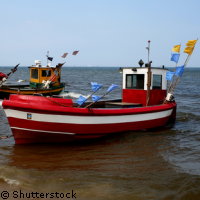Using tax records and rubbish tips to study history of Europe's fisheries
Scientists from the History of Marine Animal Populations initiative have been delving into historical archives and rummaging through prehistoric rubbish tips in a bid to understand how the fish populations of northern Europe's seas have changed over time. The researchers, whose work forms part of the international Census of Marine Life initiative, have published their findings in 14 papers in a special issue of the journal Fisheries Research. Much of the work was funded by the EU. In their introduction to the collection of papers, Henn Ojaveer of the University of Tartu, Estonia, and Brian MacKenzie of the Technical University of Denmark, explain why these studies are so important. 'Results from these and similar studies make important contributions to establishment of new baselines for management of marine ecosystems, including conservation strategies for overexploited living resources,' they write. One study by Danish researchers involved an analysis of over 100,000 fish bones found in Danish Stone Age settlements. During the period 7,000 to 3,900 BC, the waters around Denmark were warmer and saltier than they are today. The fish bones reveal that at that time, the waters were populated with what we consider to be warm water species, such as anchovy and black sea bream. Nowadays these fish are found much further south, in the warmer waters of the Mediterranean for example. However, in the last 10 to 15 years these species have returned to Danish waters as temperatures have risen. Given the higher temperatures in the Stone Age, the scientists were surprised to find large numbers of cod bones in the samples. Studies have shown that the fall in cod numbers in recent years is partly due to increasing sea temperatures affecting the survival of young cod in the North Sea. The researchers believe that these Stone Age cod were able to cope with the warmer temperatures because they were subject to much lower fishing pressure. 'These results demonstrate that major changes to the fish fauna near Denmark will occur as climate changes,' the scientists write. 'However, exploitable cod populations can potentially be maintained in waters near Denmark, including the North Sea, but the vulnerability to climate change and the risk of stock collapse will increase at present high fishing mortalities.' Meanwhile Latvian and Estonian researchers have been poring over tax records from the Latvian capital, Riga. In the late 17th Century, Europe was in the grip of the coldest period of the Little Ice Age. At that time, Riga was the largest centre of the Eastern Baltic and the main place where fishermen in the region sold their catch. All fishermen shipping fish to Riga were subject to a special tax, which was administered by the Riga Treasury College. The researchers drew on these records to find out about the species present in the Gulf of Riga during this colder time in our history. The tax records revealed that the majority of the catch was made up of herring, flounder and eelpout, all of which are known to be cold tolerant species. Species which prefer warmer waters and which are relatively common today, such as perch, made up less than 1% of the catch. The herring fishery in particular appeared to be particularly vulnerable to climatic changes, with catches falling in the period of 1685 to 1696, when the winters were particularly severe. Meanwhile socio-economic factors such as market demand are attributed to changes in the flounder and eelpout fisheries. EU support for the studies came from three Sixth Framework Programme (FP6) projects. The MarBEF ('Marine biodiversity and ecosystem functioning') and EUR-OCEANS ('Ocean Ecosystems Analysis') Networks of Excellence are both funded under the 'Sustainable development, global change and ecosystems' thematic area, while the INCOFISH ('Integrating multiple demands on coastal zones with emphasis on aquatic ecosystems and fisheries') project is funded under the 'International cooperation' area.



